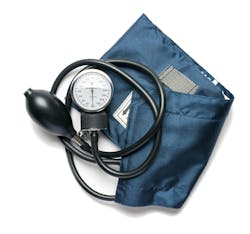New weight loss medication may help lower blood pressure in adults with obesity
The new weight loss medication tirzepatide significantly lowered the systolic blood pressure (the top number in a blood pressure reading) for nearly 500 adults with obesity who took the medication for about eight months, according to new research published in Hypertension, an American Heart Association journal.
The current research was a planned sub-study including 600 of the participants from the SURMOUNT-1 weight loss study to determine if there was an effect on blood pressure. The sub-study was designed to assess the effects of tirzepatide on blood pressure levels as measured by 24-hour ambulatory blood pressure monitoring in people with obesity but without Type 2 diabetes.
Participants received either a placebo or a dose of tirzepatide in one of three strengths (5 mg, 10 mg or 15 mg). About one-third of participants reported they had high blood pressure at the beginning of the study and were taking one or more hypertension medications. When the sub-study began, all of the participants had blood pressure levels that were less than 140/90 mm Hg, and if they used blood pressure medications, they were required to have been taking their blood pressure medications for at least three months. The sub-study included participants who had hypertension and who had normal blood pressure.
The study was conducted from December 2019 to April 2022, and the participant results after 36 weeks of taking tirzepatide indicate:
- For participants taking 5 mg of tirzepatide, there was an average reduction in systolic blood pressure of 7.4 mm Hg.
- For participants taking 10 mg of tirzepatide, there was an average reduction in systolic blood pressure of 10.6 mmHg.
- For participants taking 15 mg of tirzepatide, there was an average reduction in systolic blood pressure of 8.0 mm Hg.
- The blood-pressure lowering effects of tirzepatide were evident in blood pressure measures taken during both the day and night. Nighttime systolic blood pressure is a stronger predictor for cardiovascular death and all-cause death than daytime blood pressure readings.
The reductions in systolic blood pressure were consistent across subgroups of participants in the study who were categorized by additional factors, including age, sex, body mass index and hypertension-related risk factors.





